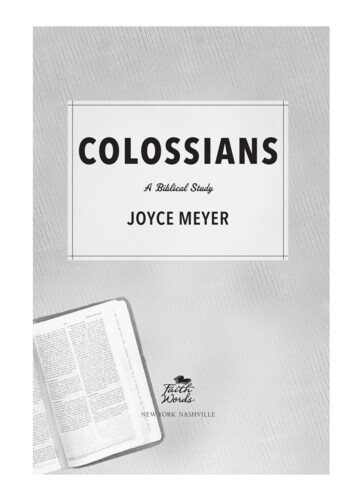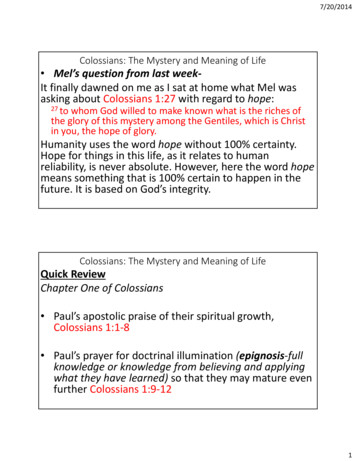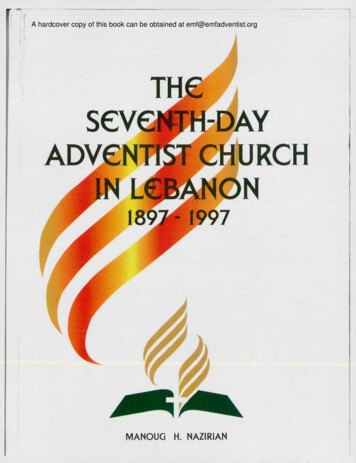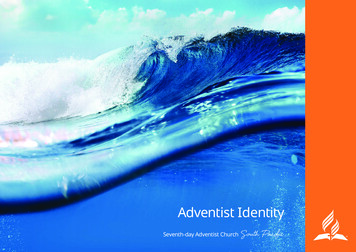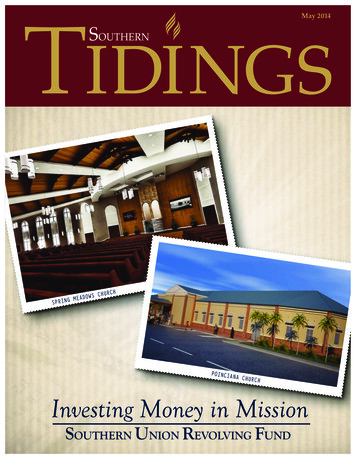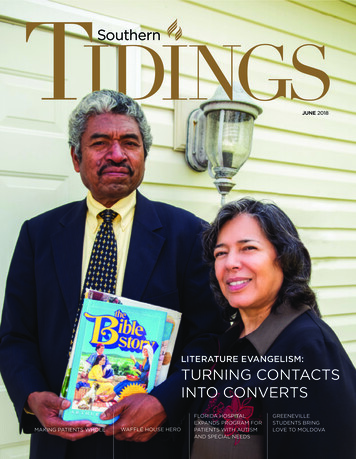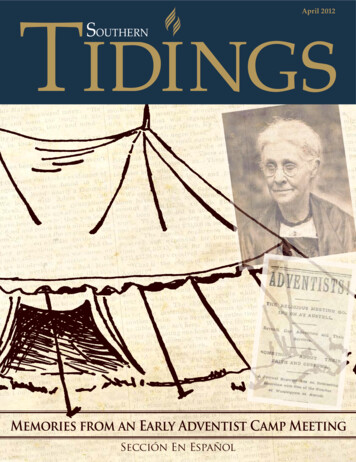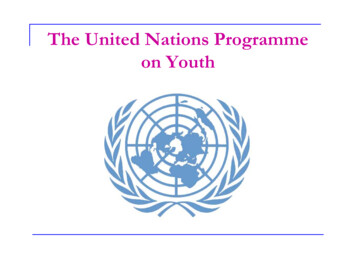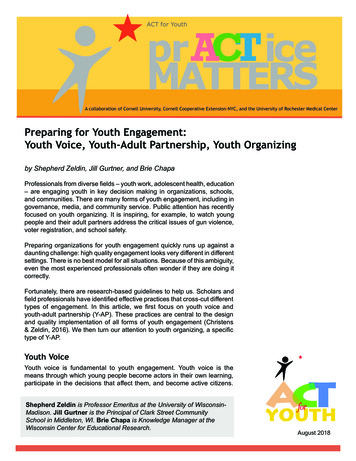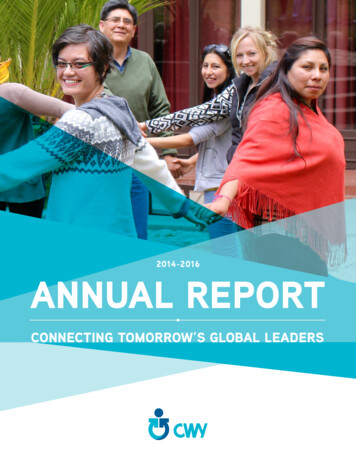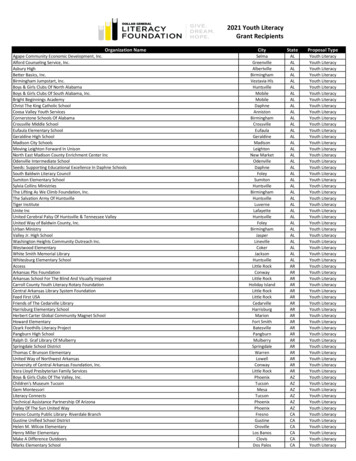
Transcription
My Identity in Christ365 Daily Devotionals“. . . and in Him you have been made complete . . .”Colossians 2:10iiiii
Youth Ministries Department General Conference of the Seventh-day Adventist ChurchMy Identity in Christ365 Daily DevotionalsCopyright 2011 by General Conference of Seventh-day Adventist ChurchAll rights reserved. No portion of this book may be reproduced, stored in a retrieval system,or transmitted in any form or by any means (electronic, mechanical, photocopy, recording,scanning, or other), without the prior written permission of the publisher.Written by Debbonaire KovacsCreditsDepartment Director: Gilbert CangyProject Supervisor: Jonatan TejelAuthor: Debbonaire KovacsCopyeditor: Erica RichardsCover and interior design: Jonatan TejelReviewed by the Biblical Research InstitutePrinted by Cadmus Communications, Conklin, New YorkGeneral Conference Youth Ministries Department2011ivv
Reflections on Identity An Introduction by Gilbert CangyMeals are ready, shoes are polished, clothes are pressed, the front and backyard areclean, the floor shines, the best meals of the week are prepared, showers have been taken;as the sun is setting, we gather around our mother for worship. It is Sabbath. Sometimes,I would get home late, distracted by an after-school football game; I would then have toface my mother, and the bamboo rod never failed to leave its marks. It was a challenge tosing praises after the ordeal. These are enduring memories of my home.In many ways, the home I grew up in defined my identity as a Seventh-day Adventist.It was forged in an environment where I saw my mother practice giving God the firstplace in our family life, in times of joy and adversity. I do not think I missed a singleSabbath service or a Wednesday prayer meeting in my childhood and adolescent years,not even during exams.I sensed I belonged to a worldwide community that was making a difference forJesus in the world. Mission stories told us so and in our family worship we prayed forthe Mission, the Union, the Division and the General Conference leaders. I had littleknowledge of what all that meant, but I knew we were part of a worldwide movement ofGod with a keen sense of its special calling to preach the everlasting gospel in the contextof the three angel’s messages of Revelation 14. Jesus was at the centre of this movementof destiny, which had young people at the core of its leadership at the very beginning.A small group of faithful people emerging from a bitter disappointment had grown toestablish a worldwide presence, and God had raised a young prophet to assist our churchin defining its character, purpose, and mission.It would be fair to say that there are times when my church, in its passion to impressthe world of the soon coming of Jesus, focuses so much on the circumstances of Hiscoming—the pre-advent judgment, the mark of the beast, the fall of Babylon—thatsometimes it overlooks the heart of the everlasting gospel. The story of Jesus is centralto our faith and lives as Seventh-day Adventist Christians. We share the Sabbath, theprophecies, the sanctuary, and the state of the dead with a hopeless world because theseteachings bring Jesus into clearer focus.This is the time for ‘Revival and Reformation’; a revival that begins with thereaffirmation of the good news of Jesus at the heart of our message and a revival of ourcalling to proclaim the everlasting gospel in the setting of the three angel’s messages. Thisdaily devotional is designed to assist us in rediscovering the faith, mission, and way of lifethat makes us who we are. We will revisit biblical stories, learn more about our church’shistory, and study our 28 fundamental beliefs.As Adventists, we are humbled by the privilege and responsibility to have beenentrusted with this special calling to share our hope in, and prepare for the soon comingof Jesus. We identify with Paul when he assured his readers that he had resolved to knownothing while he was with them “except Jesus Christ and him crucified” (1 Corinthians2:2).This remains the centre of our faith, our church, and our lives. This is our true identity.vivii
WHO AM I . . . REALLY?day 1God spoke: “Let us make human beings in our image, make them reflecting our nature so they canbe responsible for the fish in the sea, the birds in the air, the cattle, and, yes, Earth itself, and everyanimal that moves on the face of Earth.” Genesis 1:26, first part, The Message“Who are you?”It’s one of the most common questions in life.“I’m Anna Perez.”Is that an answer? Well, yes and no. Often people who ask this question only wantto know what our name is. But as we move through the years that end childhood andbegin adulthood, the question grows more urgent.Who am I? I am a son . . . a daughter . . . a friend . . . a student . . . an artist . . . amaker . . . a scientist . . . a technologist . . . a Christian . . . a Seventh-day Adventist.This year, we are going on a journey through time and space. In the first quarter, wewill peek in on patriarchs and wise women, on kings and priests and servant girls, as weseek to understand Our Source by looking more deeply into the biblical stories of theearly people on this earth, those who first learned who God is and how to relate to Him.During the second quarter we will visit people from the centuries as they pass,and learn about the heritage and roots of our faith and of the Seventh-day Adventistdenomination.Then we will seek the source and the heart of our most cherished values bystudying the 28 Fundamental Beliefs of the Seventh-day Adventist denominationthroughout the third and fourth quarters.Along the way, we will attempt to discover some answers to that perennial question,who am I really? Or at least we’ll learn some questions to ask ourselves and God as weseek to uncover those answers. Sometimes the best answers come through the questionsthemselves.As we journey through the centuries, we will journey to the heart of God . . . and toour own truest, deepest selves.Who am I? I am a beloved child of God. I didn’t just happen. God made me becauseHe wanted me.Creator of the cosmos, show me how to know You, not just to know about You,but to really know You at the heart level. Show me how to know that You know me—thereal me, the me that is so hidden that often I don’t see it myself. As we walk togetherthrough the hills and valleys of this year, show me more and more how to truly be theme You are creating me to be.viii1
day 2day 3A HANDMADE WOMANVICE PRESIDENT OF A PLANETGod created human beings; he created them godlike, reflecting God’s nature.He created them male and female. Genesis 1:27, The MessageGod created human beings; he created them godlike, reflecting God’s nature. He created them maleand female. God blessed them: “Prosper! Reproduce! Fill Earth! Take charge! Be responsible for fishin the sea and birds in the air, for every living thing that moves on the face of Earth.”Genesis 1:27, 28 The MessageThere were only two handmade people in history. Genesis says that God “formed”Adam from earth and Eve from his rib. He spoke everything else into existence, butpeople He chose to build, to model, like a sculptor making a statue. Except that nosculptor ever was able to breathe life into his or her creations!Adam might be a real shock to look at today. We have no idea what a perfecthuman would look like, even when we try to imagine it. God created Adam powerfulphysically, mentally, emotionally, and spiritually. He and Eve walked and talked withGod and were designed to be co-managers of the whole planet.Imagine God bending over the clay, carefully shaping Adam’s nose, creatingeach finger and toe, deciding how tall he would be and what kind of hair to give him.Imagine Him later putting Adam into a deep sleep, taking a rib from near his heart, andfashioning it into the perfect partner Adam had been longing for, the most beautifulhandmade woman the world has ever known.God was the Maker, and of course, Sovereign. He decided how things were to bedone and made all the rules. There were only two: Love God. Love everybody else. Doit with all you’ve got. Everything they did, from keeping the garden to celebrating theSabbath, was based on that one Great Law of Love.Then imagine being Eve and opening your eyes for the first time. Hovering overyou is the shining face of your Maker, beaming on you with love and joy. You sit up andtake a breath. How beautiful everything is!Then the Maker says, “Here, let Me help you up. There is someone waiting to meetyou.”You take God’s hand and stand, not even knowing what a miracle you are, howamazing it is that your heart is powerfully pumping away and your lungs are extractingoxygen from the rich air and spreading it throughout your strong, perfect body.“Adam,” says God, “here she is—the one made just for you, the partner who fitswith you like two leaves on the same branch.”You look. Adam looks. Love at first sight, for the first and last time in the history ofthe planet. His smile, as bright as the sunshine, reminds you of God’s—his Father andyours.The man says, “Finally! Bone of my bone, flesh of my flesh! Name her Woman forshe was made from Man” (Gen. 2:23, The Message).“I’ll call her Eve,” Adam adds. “She will be the mother of all the living yet to come.”You take his hand and the two of you walk with your Maker to explore the fabulousgarden home He has created just for you. Your life has just begun. It doesn’t even occurto you to doubt that it will last forever.Creator of the human heart, You meant us to be so strong, good, and wise. Youmeant us to be like You. I am weak, faulty, and sometimes foolish. Your dreams for meare too bright for me to see. But I want to . . . I want to! Help me to open my eyes, to seeYou walking with me, to dream your dreams after You and know that there, I will findmy true self.Angels were messengers, teaching the new humans about the world and their work,telling them stories of heaven and Creation. Perhaps they taught them about managingthe animal and plant kingdoms.Adam and Eve were next in what you might think of as a hierarchy of love. Therewas no king/subject or boss/employee relationship such as we think of now. Even theanimals looked up to and trusted their caretakers. There was no back-biting, no arguing,no laziness or blame or passing the buck.Adam and Eve worked together in all things, learning more every day about theirindividual talents and abilities. Maybe Eve was better at propagating plants, or Adamwas better at training vines. What does one do in a garden without weeds, thorns, orpests? We don’t even know!Here is what we do know: Adam looked at his realm with a reflection of the samelove with which God looked at him. He loved Eve, he loved the animals, and he evenloved the plants. He had named these things. He loved learning what each animal andplant needed for happiness, wholeness, and health (not that the concept of disease ordeath had yet entered his head!) Every day, in everything he did, Adam gave his life tothe care of those God had entrusted to him.He never thought it would end.Creator of relationships, Caregiver of my soul, it amazes me to think that aftereverything that’s happened, after everything I’ve done, You still give me my little shareof the work of caring for Your world! It’s a lot harder now than it was ever meant to be.Let me see clearly my job today, and to do it with Your love, as Your helping child.And it will last forever, because I am Your growing child.23
day 5A CROSSROADSADAM’S MOMENT OF TRUTHWhen the Woman saw that the tree looked like good eating and realized what she would get out ofit—she’d know everything!—she took and ate the fruit and then gave some to her husband, and heate. Genesis 1:27, The Message“And Adam was not the one deceived; it was the woman who was deceived and became a sinner.”1 Timothy 2:14, NIVday 4How long was it? How long did the world’s only perfect marriage last? How longdid Adam and Eve live through bright days working in a thornless garden and warmnights sleeping in perfect safety?How long did they walk and talk with God?The way the story is told, it seems like the next day that things changed. Adam iscreated Friday morning, Eve is created that afternoon, and by Sabbath evening they’reout of there! But some time must have passed. God must have told them the excitingstory of their creation and the horrible story of the war in heaven. He surely warnedthem of the fallen angels who would be after their souls. “Stay away from that tree!” Hemust have urged them earnestly. “You’ll be safe if you just stay away!”There she was: his beloved, literally bone of his bone. Juice ran down her chin, andshe waved a bitten piece of fruit.“Look, Adam!” Eve exclaimed. “This talking serpent explained it all to me. Wewon’t really die. We’ll be godlike! Here—have some!” And she held out the fruit, whileAdam stared at her in horror.The Bible teaches that the serpent (really the devil) deceived Eve—he trickedher. But Paul says Adam “was not the one deceived.” That certainly explains why thewhole Bible speaks of “the sin of Adam” that got us into all this mess! Eve’s sin was sin.She chose her own way over God’s. There was no excuse for her to be deceived by theserpent when she had already been warned about the war in heaven.But there she is, standing under the branches, looking at the bright fruit, listeningto the brighter serpent. There she is, making a decision that will affect the rest of theworld—even the rest of the universe for all time to come, if only she knew it!However, there is a difference between that sort of disobedience and the deliberatechoice to disobey even though you know perfectly well it is wrong. “Adam,” says theBible, “was not . . . deceived.” That’s shocking! Why, then, did he do it?There she is, reaching out, touching the fruit, smelling it, bringing it to her lips . . .Don’t touch it, Eve! Don’t do it!Have you ever been about to do something wrong, hesitated, recognized the callof your conscience and of the Holy Spirit, and then done it anyway? I have. Why do wedo it? Sometimes it’s sheer selfishness: I want what I want when I want it! Sometimes it’spride: God will understand this once, which really means, I know better than God. Oftenit’s fear, and it seems that might have been what motivated Adam.I’ve been there. Have you? Standing at the crossroads. Making the decision.Hearing the tempter, hearing my conscience, making excuses and justifications.Making the mistake.I’ve been there. Have you?Oh, no! She ate it! So did he! What now?I did it again, Lord! The same mistake! I sometimes think I’ll never learn to dobetter—to listen to You, not the tempter, not my own twisted logic.I’ve made this same mistake so many times before! What can I do now?What will You do now?Have You run out of patience?. . . Do You still love me? . . .Creator of Redemption, Designer of Salvation, one of the things I know I am is asinner. I’m really good at it, and I hate it! Help me! Show me the way back to Your side.Forgive me. Reform me. Walk with me again in the cool of the evening.I still want to be Your forgiven child.4He’d never felt fear before. But his beloved wife had just done what they had beenforbidden to do. What would happen to her now? What would God do to her? If Adamreally loved her, clearly the right thing to do would be to share her fate.What’s missing from this line of thinking? Trust! We know that Jesus would die forjust one sinner. Adam didn’t know that, yet. But he did know God. He walked with Himand talked with Him face to face and heart to heart. Adam knew God loved Eve morethan he did. Couldn’t he have trusted that God would come up with a plan? How couldhe have decided fear was the way to go?But he did. He grabbed the fruit and ate some. Then he waited to die.Creator, Protector, and Defender, I am Your open-eyed child. Please create in mea solid trust that will do Your will even when the reason is not clear. Please protect mefrom the devil’s sneak attacks, tricks, and rebellious attitude. Most of all, please defendme against my own selfishness and pride. I admit, I do like having my own way. But Iwant to love You more!5
CLOSED AND OPENED GATESSIMPLE GIFTS“I’m declaring war between you and the Woman, between your offspring and hers. He’ll wound yourhead, you’ll wound his heel.” Genesis 3:15, The MessageGod loves it when the giver delights in the giving. 2 Corinthians 9:7, The Messageday 6Eve huddled under Adam’s sheltering arm, hiding her face in his shoulder, sobbing.If only she had never listened to that horrible serpent! But it was too late now for “ifonly’s.” She had. And she had given Adam some of the fruit, too, and now here theywere.The serpent would be sorry—God had just cursed it to crawl on its belly. No morewould it be the wisest and most beautiful of the garden creatures.Eve held her breath to listen more clearly. What was God saying? “War betweenyou and the woman . . .” well, that was for sure! She would never even look at anotherserpent! But . . . it must be more than that. “. . . between your offspring and hers. He’llwound your head, you’ll wound his heel.”Eve lifted her head. What did that mean?We won’t know for sure until we can ask them in heaven just how much Adam andEve understood at that point. It’s certain that they would soon learn, in the newly sinfulearth, that head wounds were fatal, and heel wounds usually weren’t. Ellen White saysGod explained more to them, even telling them some of the history of the world yet tocome (PP 67).Here is what we know: That day, a shining gate was closed, but not forever. Thatday a gate was opened, also not forever. The second gate was not so beautiful—it wouldinvolve the torture and death of the Son of God—but it would lead to salvation, andthose who enter it would regain that lost garden.As we consider the question, Who Am I?, we have learned that we are all childrenof God by way of creation—made in His image, intended to care for the world and all init, intended to have a close friendship with God. That plan seemed to be derailed and inruins that dark day in Eden. But God reclaimed it. He warned that care of creation (andof each other) would be harder now, but it would still be possible.And He promised that, for those who chose it, the friendship was still possible, too!God Himself would come to us, in dreams and visions, in prophecies and oracles, insanctuary services and miracles, and in a tiny baby who was really God! If we choose,we can be children of God in a deeper way—children by choice—children of the heartand spirit.The gate is still open . . .Creator of the open gate, take my hand. I want to walk through that gate withYou. I want to walk in newness of life. I want to be Your close-following child by choice.Thank You, Lord.6day 7Abel carried the perfect lamb he had chosen toward the altar near the gate of Eden.Even in the bright light of the setting sun, he could see the flashing of the sword of theangel who guarded the gate. It was nearly time for another Sabbath sacrifice.The lamb in his arms bleated, and he looked down at it and spoke a gentle word.It always made him sad to think of the sacrifice. He was pretty sure it was supposedto make a person sad to think of it. Abel knew his mother and father were terribly sadwhen they remembered the choices they had made.Adam had explained how God told him that the innocent lamb, who hadn’t doneanything wrong, represented the Redeemer God would send, who also would not doanything wrong, but would die for sinful humans anyway.Abel couldn’t say he really understood it all completely. But he accepted it. It wasGod, and Abel trusted God. After all, hadn’t God forgiven his parents for the wrongthey had done? Hadn’t He promised a Redeemer even though they didn’t feel theydeserved it? If Abel could keep the memory of the promise alive by offering the best ofhis flock, then he was willing to do that.Abel looked toward his brother, Cain, also heading toward the altar. He didn’tworry and brood over things as Cain did. Cain was always complaining, alwaysquestioning and arguing. Look at him tonight—a basket of fruit and vegetables? Whywould he bring that?Abel brought his attention back to his own sacrifice. He lifted his eyes to heavenand prayed silently, “I am Your simple child, God. What You want me to do, that’s whatI want to do. My sacrifices are small, and not worthy of Your regard, but they are mybest, and I offer them with love. Please accept them, and please accept me.”Today, God does not ask us to give Him burnt offerings. He has provided the Lambfor every human being who ever lived. Jesus’ life, death, and resurrection are sufficientfor every sin ever committed. What God asks today is that we accept that gift on ourbehalf. It’s as simple—simpler!—than the sacrifices Adam, Eve, and Abel brought. ThenHe asks us to give ourselves—our gifts, our talents, our interests, our hard work. It’shard, but it’s not complicated. It’s very simple.Creator of every good and perfect gift, I am Your simple child. What You want meto do, that’s what I want to do. My sacrifices are small, and not worthy of Your regard,but they are my best, and I offer them with love. Please accept them, and please acceptme.7
day 9GOD TALKS TO SINNERSHOLDING HANDS WITH GODGOD spoke to Cain: “Why this tantrum? Why the sulking? If you do well, won’t you be accepted?And if you don’t do well, sin is lying in wait for you, ready to pounce; it’s out to get you, you’ve got tomaster it.” Genesis 4:6, 7, The MessageBy an act of faith, Enoch skipped death completely. “They looked all over and couldn’t find him because God had taken him.” We know on the basis of reliable testimony that before he was taken “hepleased God.” Hebrews 11:5, The MessageCain knew all the rules for sacrifice. His whole life, he had watched his dad, Adam,sacrificing burnt offerings on the altar. Now Cain and his brother Abel were grown upand making their own sacrifices. Abel had made a sacrifice of a lamb, but that was easyfor him, Cain thought. Abel was a shepherd and had plenty of flocks to spare. Cain wasa gardener, and he thought his offering of fruits and vegetables should be just as good.Didn’t God like it that he knew how to grow good food?You’ve probably heard the story all your life. “Enoch walked with God” (Gen. 5:22).The Message has it, “walked steadily with God.” Then “he was not.” He disappeared. Oneway it’s told is that Enoch walked with God so long that one day God said, “Enoch, we’recloser to My house than yours; why don’t you come on home with Me?”day 8Well, of course, God did. An offering of Cain’s best could have been accepted withdelight if it had been given as a freewill offering along with the required lamb. But notinstead. Cain did not get to make his own rules.So now he was sulking. He was probably muttering to himself about how Godloved Abel better, and Abel was a goody-goody.Imagine his shock when God spoke to him! “If you do what you know is right,you’ll be accepted,” He promised. Then He added a warning. “Sin is lying in wait foryou.” Other Bibles say, “Crouching at your door.” In other words, watch out—the devil isout to get you.Cain might have thought God would only speak to people who were doingeverything right. Lots of people think that today. Or they think God doesn’t speak at all,to anyone, anymore. The story of Cain teaches us otherwise. God reached out to Cainwhen he was in a state of rebellion, without waiting for Cain to repent and reach outto Him. God had done the same for Adam and Eve, and He’s doing the same for othersinners today.Put yourself in Cain’s place. Think about something you have done wrong or areangry about. Do you feel God is being unfair? Read the words God spoke to Cain andimagine Him saying them to you. What would you say back? What do you think Godwould say then?Great Mender of broken relationships, please forgive me. Remind me that evenwhen I am in rebellion, I am still Your chosen child, and I can still turn around andchoose You again. Don’t give up on me—keep speaking! I’m listening . . .8Did you ever wonder how they knew God had taken him? Couldn’t he have justdied somewhere, out where no one saw him? Couldn’t wild animals have gotten him,or bandits? How did they know that when they couldn’t find Enoch, it meant God hadtaken him to heaven without death?No doubt part of that answer is to be found in revelation; in other words, God toldsomeone, whether by vision, or in a dream. Or maybe someone even saw him disappear,as Elisha saw Elijah go into heaven.But the most important reason people knew where Enoch had gone is because ofwho Enoch was. He walked with God. Everywhere he went, people could tell Enoch washolding God’s hand.How did they know that? What did Enoch do that made it clear he was alwaysaware of God by his side? Some things are obvious, even without knowing Enoch.He must have been kind and loving and helpful. He must have been self-sacrificing,looking out for the needs of others. He must have been clearly different from the rapidlyworsening people in the pre-Flood era.But there’s one more thing we know about Enoch, and it’s found in that tiny littlebook called Jude. Jude 13-15 says that Enoch prophesied about the Second Coming!Thousands of years before Jesus was even born the first time, Enoch saw a vision aboutHim coming in judgment. There’s only one way he could have seen that: He and Godwere close friends.Great Leader, I know that Your deepest desire is that each of us follow You asclosely as Enoch did. I desire that, too. I long to be constantly and contentedly aware ofYour gentle, guiding presence. I want to cling to Your hand like a little child, walkingby Your side through this world. Then, someday soon, I want to go home with You! Thesooner, the better!9
day 11GOD LIKED WHAT HE SAWWHAT JOB KNEWNoah was different. God liked what he saw in Noah . . . Noah was a good man, a man of integrity inhis community. Noah walked with God. Genesis 6:8, 9, The Message“I know that God lives—the One who gives me back my life— and eventually he’ll take his stand onearth. And I’ll see him . . . see God myself, with my very own eyes. Oh, how I long for that day!”Job 19:26, 27, The Messageday 10Now, isn’t that interesting—Noah, who was Enoch’s great-grandson, walked withGod, too! In those days, people lived so long that it was amazing that Enoch was gonebefore Noah was born. Adam himself, father of the whole race, died only 126 yearsbefore Noah’s birth, and he had still been alive when Enoch turned 300!Poor Job! He reminds me of some people I know, people who are living throughtrauma after tragedy after crisis, and it never seems to stop. You have to wonder, “Why,God? What did he/she ever do to deserve this?”This was a bitter time for God. He had been so joyful when He created the world,with people to love. Now there was almost no one at all, on the whole planet, who lovedGod back. The Message says God’s heart was broken, and I think that’s true. Don’t you?He got depressed: “Obliterate the day I was born. Blank out the night I wasconceived! Let it be a black hole in space. May God above forget it ever happened . . .Why didn’t I die at birth, my first breath out of the womb my last?” (Job 3:3, 11).Now the whole world was going to be destroyed, but God still wanted to save asmany as He could. Perhaps the fear of knowing the Flood was coming would turn someof them back to Him. God asked Noah to build the ark, and to preach as earnestly as hecould, begging and pleading with people to get on and be saved. For 120 years!He was fearful. “If I say, ‘I’m going to bed, then I’ll feel better. A little nap will liftmy spirits,’ You come and so scare me with nightmares and frighten me with ghosts thatI’d rather strangle in the bedclothes than face this kind of life any longer” (7:13-15).Is it okay to tell God the truth about how you feel? Job did.It’s interesting to think about: God didn’t ask for a change of heart or mind. He justasked them to walk up the ramp and get on. How hard was that? It was kind of like,“Don’t eat from that one tree!”Most of all, Job was angry. He was very angry, and he let God know it. “So what’sthis all about, anyway—this compulsion to dig up some dirt, to find some skeleton inmy closet? You know good and well I’m not guilty. You also know no one can help me”(10:6, 7).Noah, by his actions, said to those around him, “No matter how silly it may appearto you, I am God’s child first. Your friendship and your opinion of me come after that inimportance.”This could be seen as lack of trust, or even lack of respect. But if you read all of Job,you will find songs of praise scattered through it. Job speaks of God’s power and grace,and assures his friends that even if God kills him, he will still choose to trust (13:15).I wonder how hard it was for Noah to keep on building, to keep on preaching, yearafter year, decade after decade, when everyone except his own family thought he wasnuts.Because there’s one thing Job knows for sure. It’s found in our focus text for today:I know my Redeemer lives, and that He will take His stand on the earth, and I will seeHim.I wonder how hard it’s going to be this week for me, or for you, to keep on lovingGod, to keep on being kind, to go on loving everyone around us, and acting on it . . . nomatter what they say or think . . .Loving Father, help me be determined to be Your steadfast child first. Let nothingelse in life, no matter how important or how difficult or how tempting, come beforethat. Let my words and actions show all those around me that I belong to You.10Oh, how I long for that day, too! How about you?Faithful Redeemer, I don’t always understand why You so often lead throughsuch deep, dark valleys of pain, such scary, nightmarish forests of trouble, such searingdeserts of loss and grief and anger. But this one thing I know: You are with me. I amwith You. I will see You and You will make it all pla
daily devotional is designed to assist us in rediscovering the faith, mission, and way of life that makes us who we are. We will revisit biblical stories, learn more about our church's history, and study our 28 fundamental beliefs. As Adventists, we are humbled by the privilege and responsibility to have been
